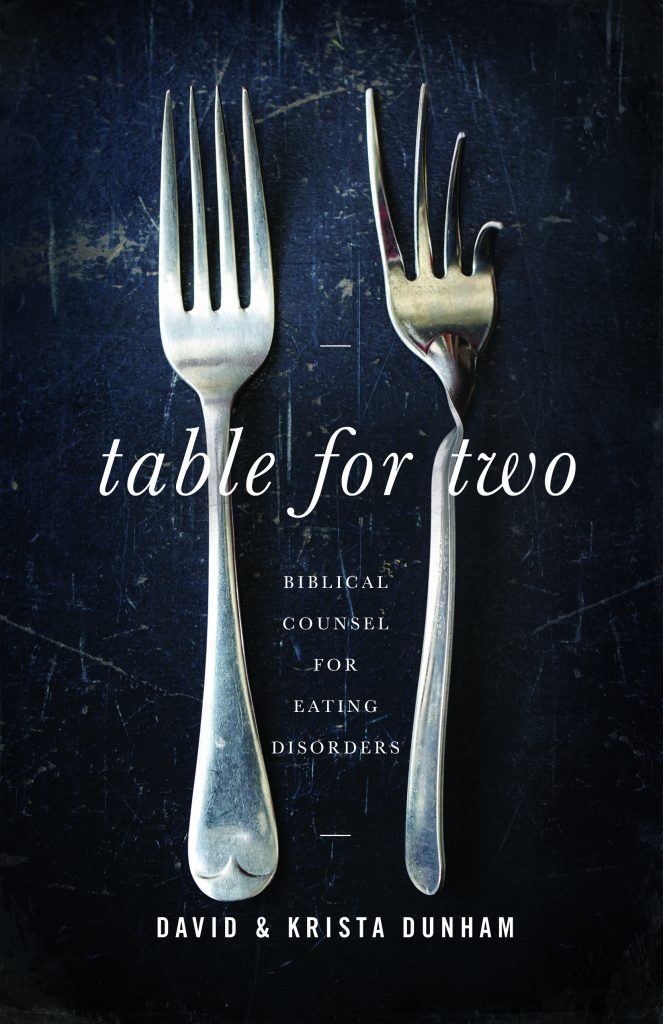We had only been together for a year when my girlfriend (now wife) first revealed to me that she had an eating disorder. It took more than ten years for Krista to overcome this struggle, and it took me nearly that long to figure out how to help her. Helping her required that I understand her heart better and learn to draw it out.
Far too often, helpers in all kinds of scenarios settle for simplistic explanations of a person’s struggle and surface level treatments. Scripture tells us that getting to the heart of a problem, however, requires digging deep. Proverbs 20:5 (ESV) states:
“The purpose in a man’s heart is like deep water, but a man of understanding will draw it out.”
Proverbs 20:5
The imagery here is like a deep well. Drawing out this water will require effort and patience. It will require going deeper than just the surface of the issue and skimming the water. Eating disorders are hard for helpers to understand, and certainly entail struggles that go far beyond the surface level. I certainly didn’t understand Krista when she first began to reveal the depths of her problem. Being a man or woman of understanding, however, requires that we go deep into the well of an eating disorder.
Understanding Motives
Eating disorders have an internal logic to them. My wife restricted her food intake, worked out obsessively, and used several means to purge food from her system because it gave her a sense of control over her life. Initially my efforts to help her failed to consider these dynamics. I didn’t take the time to understand the purposes in her heart, and therefore my offers of help were trite and insensitive to her needs.
There are a variety of motives which drive an eating disorder. Common motives such as control, punishment, appearance, and pride lie underneath the surface of disordered eating habits. Understanding my wife required that I consider her personal insecurities, her struggles, desires, and expectations. Such understanding required more than me offering simplistic advice on eating or rebuking her for not taking care of herself. We got married when we were both twenty-one, and my own immaturity added to her suffering in many serious ways that I still regret. I didn’t really want to understand her eating disorder. It felt inconvenient to me.
Though I was initially ambitious about helping her, the longer the problems stretched on, the less committed I became. I simply didn’t want to dive into the depths of her struggles and understand her rationale. I had often relied on her to tell me what to do. There were times where I would sincerely ask her, “What can I do to help?” but she didn’t know the answer to that question. The prophet Jeremiah explains, “The heart is deceitful above all things, and desperately sick; who can understand it?” (Jeremiah 17:9). Understanding ourselves and understanding others is complicated and challenging. My role as a helper required drawing out the deep water of her heart.
Drawing Out Motives
Helping a loved one with an eating disorder can feel particularly overwhelming because most of us are not trained counselors, let alone trained eating disorder specialists. There is so much that goes into an eating disorder, and the health risks involved are extremely high. I often encouraged Krista to see counselors and meet with specialists. Professional help is important, but I often wanted her to seek out that kind of help to absolve myself of responsibility. If she was seeing a counselor, then I didn’t need to participate in helping her. The truth, however, is that friends and family are the ones most consistently involved in a sufferer’s life. I was Krista’s most immediate “neighbor,” and she needed to sense my love and support in her recovery. This meant I needed to learn how to help draw out what was going on in her heart.
Drawing out my wife’s heart involved asking good questions, listening to her responses, and empathizing with her hurts and insecurities. A surface level response would focus entirely on her behavior. I would sometimes pressure her to eat what I thought she needed to eat or make her feel guilty for not going out to dinner with friends. Jesus tells us, however, that “where your treasure is there your heart will be also” (Matthew 6:21). Drawing out her heart meant seeking to understand more of what my wife loved and what made her feel safe and secure. She relied on her destructive eating habits because they accomplished something for her. If I was going to draw out her heart, I needed to know what that was.
Jesus in the Depths
Ultimately Jesus himself is our example in loving those who suffer from eating disorders. Jesus understood both our suffering and our sin. He never needed to gain understanding of it, but he chose to incarnate his love by stepping down into our world and experiencing it with us. He is able to “sympathize with our weakness” (Hebrews 4:15). Learning to love my wife in the midst of her eating disorder meant imitating the love of Christ.
Jesus did not love us from a distance. He did not merely send good thoughts our way or lecture us on the mess we were making. He allowed our brokenness to touch him; in fact, he was willing to come and touch our brokenness for himself. Loving my wife meant I needed to let her brokenness become my brokenness. I needed to be not just inconvenienced but moved to empathize with her. I needed to weep with her (Romans 12:15). I needed to consider her interests as more significant than my own (Philippians 2:3-4). I needed to sacrifice my wants, expectations, and desires, in order to genuinely help her carry the burden of destructive eating. That is the example of Jesus.
Questions to Consider
If your loved one is struggling with an eating disorder, you might consider asking them some of these questions:
- When are you most tempted to engage in destructive eating habits?
- Is there anything about quitting your habits that causes you to fear? What do you think you will lose if you give up your habits?
- When you first started engaging in disordered eating practices, what was your goal? How has that goal changed? How have your habits changed?
The answers to these questions may shed some light on what your loved one values and how eating disorders serve those values.
You don’t have to be an eating disorder specialist to love and care for those in your life who are suffering. You simply need to be a man or woman of understanding. You need to be willing to plumb the depths of their heart.
TABLE FOR TWO: BIBLICAL COUNSEL FOR EATING DISORDERS
Breaking free from an eating disorder is difficult and complex. From the unique perspective of a husband and wife team, Table for Two shares Krista Dunham’s journey to freedom from her eating disorder while David shares insights as the loved one coming beside her.






